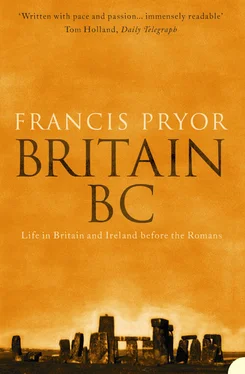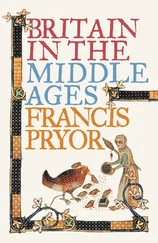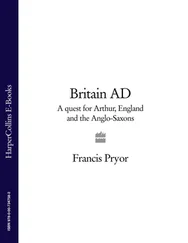Britain B.C.
Life in Britain and Ireland
Before the Romans
Francis Pryor
For
TOBY FOX
and
MALCOLM GIBB
Title Page
Dedication
Preface
Dates and Periods
Part I: Another Country
Chapter One: In the Beginning
Chapter Two: Neanderthals, the Red ‘Lady’ and Ages of Ice
Chapter Three: Hotting up: Hunters at the End of the Ice Age
Part II: An Island People
Chapter Four: After the Ice
Chapter Five: DNA and the Adoption of Farming
Chapter Six: The Earlier Neolithic (4200-3000 BC)
Chapter Seven: The Earlier Neolithic (4200-3000 BC)
Chapter Eight: The Archaeology of Death in the Neolithic
Part III: The Tyranny of Technology
Chapter Nine: The Age of Stonehenge (the Final Neolithic and Earliest Bronze Age: 2500-1800 BC)
Chapter Ten: Pathways to Paradise (the Mid- and Later Bronze Age: 1800-700 BC)
Chapter Eleven: Men of Iron (the Early Iron Age: 700-150 BC)
Chapter Twelve: Glimpses of Vanished Ways (the Later Iron Age: 200 BC-AD 43, and After)
Afterword
Places to Visit
Notes
Index
P.S. Ideas, interviews & features…
About the author
Portrait
Snapshot
Top Ten Favourite Books
About the book
A Visit to Flag Fen
A Critical Eye
Read on
Have You Read?
If You Loved This, You’ll Like…
Find Out More
Acknowledgements
About the Author
Praise
By the same author
Copyright
About the Publisher
Preface
British ‘Peculiarity’
I decided to write this book because I am fascinated by the story that British prehistory has to tell. By ‘prehistory’ I mean the half-million or so years that elapsed before the Romans introduced written records to the British Isles in AD 43. I could add here that I was tempted to give the book a subtitle suggested to me by Mike Parker Pearson: ‘The Missing 99 Per Cent of British and Irish History’ – but I resisted. In any case, when the Roman Conquest happened, British prehistory did not simply hit the buffers. Soldiers alone cannot bring a culture to a full stop, as Hitler was to discover two millennia later. It is my contention that the influences of British pre-Roman cultures are still of fundamental importance to modern British society. If this sounds far-fetched, we will see that Britain and Ireland’s prehistoric populations had over six thousand years in which to develop their special insular characteristics.
I regard the nations of the British Isles as having more that unites than divides them, and as being culturally peculiar when compared with other European states. I believe that this peculiarity can be traced back to the time when Britain became a series of offshore islands, around 6000 BC. Those six millennia of insular development gave British culture a unique identity and strength that was able to survive the tribulations posed by the Roman Conquest, and the folk movements of the post-Roman Migration Period, culminating in the Danish raids, the Danelaw and of course the Norman Conquest of 1066. It’s in the very nature of British culture to be flexible and to absorb, and sometimes to enliven or transform, influences from outside. Nowhere is this better illustrated than by the historical hybrid that is the English language, which many regard as Britain’s greatest contribution to world culture.
The English language is of course a post-Roman phenomenon that owes much to influences from across the North Sea. Very recent research carried out by a team of scientists from University College (London University) Centre for Genetic Anthropology has shown that the genetic make-up of men now living in English towns mentioned in the Domesday Survey of 1086 is closely similar to that of men from Norway and the Province of Friesland in northern Holland. 1 By contrast, Welshmen from towns on the other side of Offa’s Dyke are genetically very different from English, Dutch and Norwegian males. Does this mean (as some have claimed) that the Anglo-Saxon ‘invasions’ of the early post-Roman centuries wiped out all the native Britons in what was later to become England? I suppose that on the face of it, it could, although I’d like to see more supporting data, because there’s very little actual archaeological evidence for the type of wholesale slaughter such a theory demands. Besides, people have always had to live in settlements and landscapes, which over the centuries acquire their own myths, legends and histories. These in turn may have a profound effect on the incoming component of the local population. It’s not by any means a simple business of one lot in and another lot out.
It is difficult to accept that the entire British cultural heritage of England was wiped out by the Anglo-Saxons. Why, for example, did the newcomers continue to live in the same places as the people they are supposed to have ousted, retaining the earlier place-names? It simply doesn’t make sense, and we should be cautious before adopting all the findings of molecular biology holus-bolus. Culture and population are not synonymous.
Stories have plots and themes, and I have fashioned this book around what I think are the most important. But inevitably I have had to omit an enormous amount of significant material, simply because it fell outside the immediate scope of the story. However, Britain B.C. is not intended to be a textbook, nor is it in any way comprehensive. It’s essentially a narrative – and a personal one at that. This is how I see the story of British prehistory unfolding, and I hold the view that a good narrative should be clear-cut, and not cluttered with fascinating but inessential detail.
What is it about archaeology that fascinates so many people? My own theory is that it’s because it is a tactile, hands-on subject. It isn’t something that exists in the mind alone. Unlike archaeologists, historians rarely get the opportunity to hold something that was last touched by a human hand thousands of years ago. Archaeology is a vivid and direct link to the past, which I believe accounts for the immediacy of its appeal – and to a wide cross-section of society. Over twenty years ago my wife was on a train from London to Huntingdon and found herself sitting next to the British heavyweight boxer Joe Bugner. He was charming and impeccably mannered. At the time he was a national celebrity, but when he discovered that Maisie was an archaeologist he confided that that was something he had always wanted to be. Then this morning I opened The Times to read that the most famous (or infamous) heavyweight of them all, Mike Tyson, had stated: ‘I would like to be an archaeologist.’ 2 I would imagine that both of them could wield a mattock quite effectively.
Many archaeological books which purport to be non-technical are written as impersonal descriptions of places and objects that are seldom explained, and are united only by the thinnest of themes. As a result, the public may be forgiven for wondering why so much money is currently being spent on a subject that seems to produce such dreary results. ‘Does it really matter?’ is a question I’ve been asked many times in recent years. Of course I think it does. I believe passionately that archaeology is vitally important. Without an informed understanding of our origins and history, we will never place our personal and national lives in a true context. And if we cannot do that, then we are prey to nationalists, fundamentalists and bigots of all sorts, who assert that the revelations or half-truths to which they subscribe are an integral part of human history. It needs to be stated quite clearly: they’re not. In my view, the main lesson of prehistory is that humanity is generally humane, but from time to time is subject to bouts of extreme and unpleasant ruthlessness. Of course one cannot be sure, but I wonder whether this ruthlessness is perhaps a relict survival mechanism that goes back to our origins as a distinct and separate species, known as Homo sapiens. Whatever the cause, the important thing is that it exists, and we should recognise it, not just in others, but within ourselves as well.
Читать дальше












